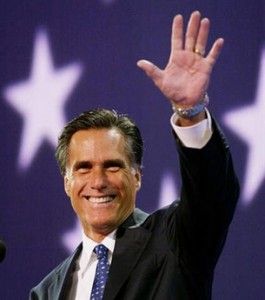Mitt Romney won Nevada caucuses
Mitt Romney confirmed his status as the prohibitive front-runner in the GOP presidential race Saturday with a win in the Nevada caucuses.
But Romney’s apparently large margin of victory may say more about his opponents than his own candidacy.
While Romney’s first-place finish was never really in doubt, the lack of traction from the two men vying to be the top non-Romney candidate in the race was perhaps the biggest development.
Newt Gingrich, whose campaign was riding high after its win in the South Carolina primary just two weeks ago, has fallen quickly since then.
Almost instantly after the South Carolina contest January 21, Romney’s campaign regained its position atop the polls and delivered a double-digit win in Florida.
Four days later in Nevada, he obliterated Gingrich.
Now, the fact that Gingrich finished so far behind Romney might seem forgivable. This is a state, after all, where eventual 2008 nominee John McCain finished a distant third to Romney, behind even Rep. Ron Paul (R-Texas), with 13 percent.
Gingrich still may finish behind Paul himself. But while McCain didn’t seriously compete in the Silver State four years ago, Gingrich has been in Nevada since Wednesday, and his performance has been pretty disastrous. Basically every day this week, there has been something to suggest a campaign that’s not really ready for prime time: be it scheduling snafus, incorrectly leaking that Donald Trump would endorse his campaign, or the candidate apparently being unaware of a pretty significant jobs report on Friday.
And in fact, this is the second state where that’s happened.
Mitt Romney handily won the Nevada caucuses Saturday, capping a pivotal week that saw him regain his front-runner status on the strength of a hard-fought win in Florida.
With 41 % of the precincts counted, the former Massachusetts governor was the top pick of 42 % of Republican caucus-goers, with former House Speaker Newt Gingrich a distant second with 26,5 % of the vote and Texas Rep. Ron Paul in third at 18 %.
Mr. Romney’s back-to-back, double-digit victories in Florida and Nevada cement his status as the candidate to beat heading into the first extended lull of the Republican nominating contest.
“This is not the first time you have given me your vote of confidence, and this time, I’m going to take it to the White House” – a buoyant Mr. Romney told supporters in Las Vegas, referring to his 2008 win in the state.
The three-week lull will follow a series of contests Tuesday, and it could prove a tenuous stretch for Mr. Romney’s rivals as they try to raise money and convince Republican voters they have a real shot at the nomination.
Mr. Gingrich failed to reboot his insurgent campaign in Nevada after he surrendered a big lead in Florida. He drew enthusiastic, if occasionally thin, crowds in the Silver State. But his Nevada bid was plagued by disorganization.
The former House speaker spent much of Saturday at a hotel in Las Vegas plotting the path forward to Super Tuesday on March 6, when additional Southern states will have their say.
Mr. Gingrich and his aides discussed whether he should return to a positive campaign based on the kind of big ideas that had been his hallmark before a dogfight broke out in Iowa with the former Massachusetts governor. The Gingrich campaign also met with donors to reassure his financial backers that a path still exists to the nomination.
He kicked off a Saturday-night press conference by assuring the assembled reporters that he has no plans to exit the race.
“I am a candidate for President of the United States, I will be a candidate for president of the United States, we will go to Tampa” – Mr. Gingrich said, restating his pledge to stay in the race until the Republican convention this summer.
As he did in 2008, Mitt Romney won the 2012 Nevada Republican caucuses with a sizeable victory. Romney has now won three out of the five Republican primaries or caucuses held so far this year – New Hampshire, Florida and Nevada.
CBS News entrance polls show Romney won among most demographic groups. He received strong support from Mormon voters in Nevada – a group he also won overwhelmingly in the 2008 Nevada caucuses. Mormons made up 26 percent of caucus attendees this year, and Romney won a whopping 90 percent of them.
Romney did particularly well with some important groups of voters:
- Romney won among the 4 in 5 voters who identified themselves as Republicans, receiving 59 percent of their votes. This is the largest share of the Republican vote that Romney has received in the five states that have voted so far.
- Romney also won among Nevada’s conservative voters, 54 percent of whom supported him. That too is the largest share of the vote Romney has received from this group in primaries and caucuses this year.
- While he has struggled with the most conservative voters in some of the contests already held – Rick Santorum won among very conservative voters in Iowa, and Newt Gingrich did so in South Carolina and Florida – Romney also won this group in Nevada. Forty-eight percent of Nevada caucus attendees call themselves very conservative: 49 percent supported Romney, and 24 percent supported Gingrich.
- While Romney lost among Tea Party supporters in Iowa and South Carolina, he won them handily in Nevada, 50 percent to Gingrich’s 23 percent. This was also Romney’s best showing among Tea Party supporters in the contests so far this year – 74 percent of Nevada voters said they support the Tea Party.
Romney received 57 percent of the vote among moderates, a group he has carried in all five contests to date.
